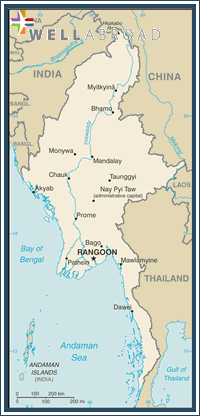|
MOST RECENT ALERTS
There's no recent alert.
|

|
|||||||||||||||
| COUNTRY OVERVIEW | ||||||||||||||||
|---|---|---|---|---|---|---|---|---|---|---|---|---|---|---|---|---|
|
| COUNTRY GENERAL INFORMATION | |||||||
|---|---|---|---|---|---|---|---|
| Language: |
Burmese, minority ethnic groups have their own languages |
||||||
| Currency: | Kyat (MMK) | ||||||
| Predominant Religions: |
Buddhist 89%, Christian 4% (Baptist 3%, Roman Catholic 1%), Muslim 4%, animist 1%, other 2% |
||||||
| National Holidays: | Independence Day, 4 January (1948); Union Day, 12 February (1947) | ||||||
| Economic Status: |
Myanmar, a resource-rich country, suffers from pervasive government controls, inefficient economic policies, and rural poverty. The junta took steps in the early 1990s to liberalize the economy after decades of failure under the "Burmese Way to Socialism," but those efforts stalled, and some of the liberalization measures were rescinded. Despite Myanmar's increasing oil and gas revenue, socio-economic conditions have deteriorated due to the regime's mismanagement of the economy. |
||||||
| Security: |
Myanmar Armed Forces (Tatmadaw): Army, Navy, Air Force |
||||||
| US Presence: |
U.S. Embassy Rangoon |
||||||
| Document Requirements: |
The Government of Myanmar strictly controls travel to, from, and within Myanmar. Since October 1, 2006, Burmese authorities have often prohibited entry or exit at most land border crossings, unless the traveler is part of a package tour group that has received prior permission from the Burmese authorities. A passport and visa are required for entry into Myanmar. Travelers are required to show their passports with a valid visa at all airports, train stations, and hotels. Security checkpoints are common outside of tourist areas. Burmese authorities rarely issue visas to persons with occupations they deem “sensitive,” including journalists. Many journalists and writers traveling to Myanmar on tourist visas have been denied entry. Journalists -- and tourists mistaken for journalists -- have been harassed. Some journalists have had film and notes confiscated upon leaving the country. Information about dual nationality or the prevention of international child abduction can be found on our web site. For further information about customs regulations, please read our Customs Information sheet. |
||||||
| Major Airports: |
Airports: 85, Airports w/paved runways: 21 Yangon International Airport (RGN/VYYY) Mandalay International Airport (MDL/VYMD) |
||||||
| Servicing Airlines: |
|
||||||
| Risks and Precautions: |
Myanmar is a source country for men, women, and children trafficked to East and Southeast Asia for sexual exploitation, domestic service, and forced commercial labor; to a lesser extent, Myanmar is a country of transit and destination for women trafficked from China for sexual exploitation; internal trafficking of persons occurs primarily for labor in industrial zones and agricultural estates; internal trafficking of women and girls for sexual exploitation occurs from villages to urban centers and other areas; the military junta's economic mismanagement, human rights abuses, and policy of using forced labor are driving factors behind Myanmar's large trafficking problem |
||||||
| Mortality Statistics: |
Infant MR total: 61.85 deaths/1,000 live births |
||||||
| Immunization Indicators: |
Required: None |
||||||
| Infectious Disease Concerns: |
degree of risk: very high |
||||||
| Overall Quality of Medical Services: |
Medical facilities in Myanmar are inadequate for even routine medical care. There are few trained medical personnel. Most foreign drugs on sale have been smuggled into the country, and many are counterfeit or adulterated and thus unsafe to use. HIV/AIDS is widespread among high-risk populations such as prostitutes and illegal drug users. Malaria, tuberculosis, hepatitis, and other infectious diseases are endemic in most parts of the country. |
||||||
| Providers in Network: |
|
||||||
| Recent Medical Threats/ Concerns/Warnings: |
Highly pathogenic avian influenza (H5N1) continues to cause outbreaks in domestic and wild bird populations and has caused human cases in several countries in Southeast Asia. In 2006, the virus continued to spread in poultry populations in Indonesia. Avoid all direct contact with birds, including domestic poultry (such as chickens and ducks) and wild birds, and avoid places such as poultry farms and bird markets where live birds are raised or kept. For a current list of countries reporting outbreaks of H5N1 among poultry and/or wild birds, view updates from the World Organization for Animal Health (OIE), and for total numbers of confirmed human cases of H5N1 virus by country see the World Health Organization (WHO) Avian Influenza website. |
||||||
| Communications Info: |
Country Calling Code: +95 |
||||||






